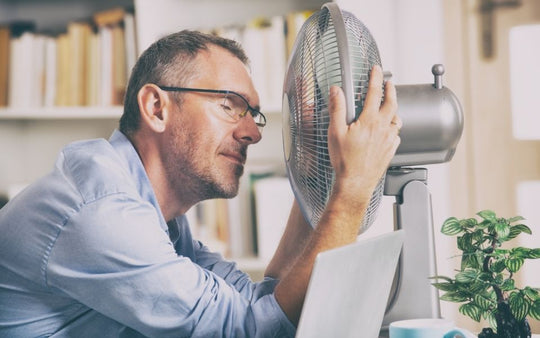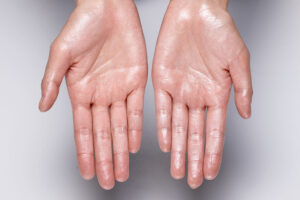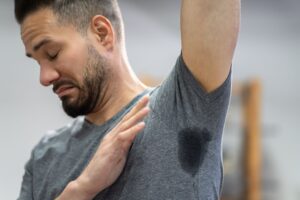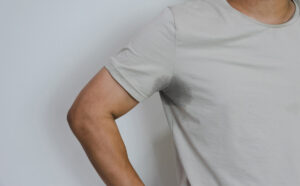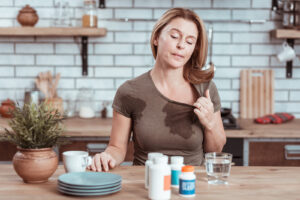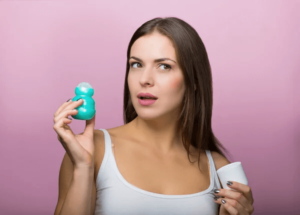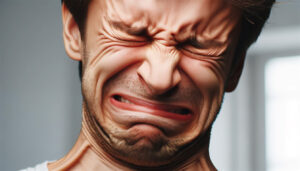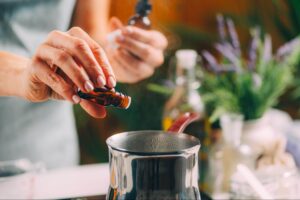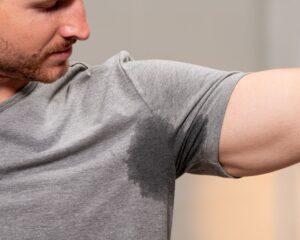If you’ve ever suffered through an awkward sweaty hug, a slippery handshake, or a sweat-soaked job interview — this article is for you.
How to stop sweating and feeling at ease is the core of our discussion today. In this simple guide, you’ll learn how to stop sweating so much and how to stop worrying so much about embarrassing sweat.
We’ll explore everything from traditional antiperspirants and deodorants to diet hacks and lifestyle changes that will help you understand how to reduce sweating.
Here’s a quick preview of what we’ll be covering…
Before you delve into this masterpiece and show you how to sweat less 😉, check out this article about why excessive sweating occurs in the first place. Understanding the “why” to your sweat situation will get you closer to solving your sweat problems. How to stop sweating so much can be your breakthrough.
Let’s take a closer look at some of the most effective ways to tackle heavy sweating…
9 Ways to Prevent Excessive Sweat
- 1. Use a strong antiperspirant.
- 2. Apply antiperspirant correctly.
- 3. Dress Smart. Sweat Less..
- 4. Manage Diet to Control Sweat.
- 5. Exercise frequently to combat stress sweat.
- 6. Relax – Don’t “sweat” your sweat.
- 7. Home remedies to Stop Sweating.
- 8. Medications to control excessive sweating.
- 9. Popular treatments for hyperhidrosis.
1. Use a STRONG Antiperspirant

Run-of-the-mill antiperspirants and “aluminum-free” deodorants are no match for heavy sweating. Look for a strong, clinical strength antiperspirant to fend off embarrassing sweat. Learning how to stop sweating effectively starts with choosing the right products.
The best antiperspirants will contain higher amounts of aluminum salt. Aluminum salts have been used to treat excessive sweating for almost a century.
Aluminum Chloride is one of the strongest active ingredients for sweat control.
If you suffer from hyperhidrosis (excessive sweating), you’ll want to try a clinical antiperspirant with at least 12% Aluminum Chloride or 20% Aluminum Sesquichlorohydrate.
Remember, always consult your doctor before using.
2. Apply Antiperspirant Correctly
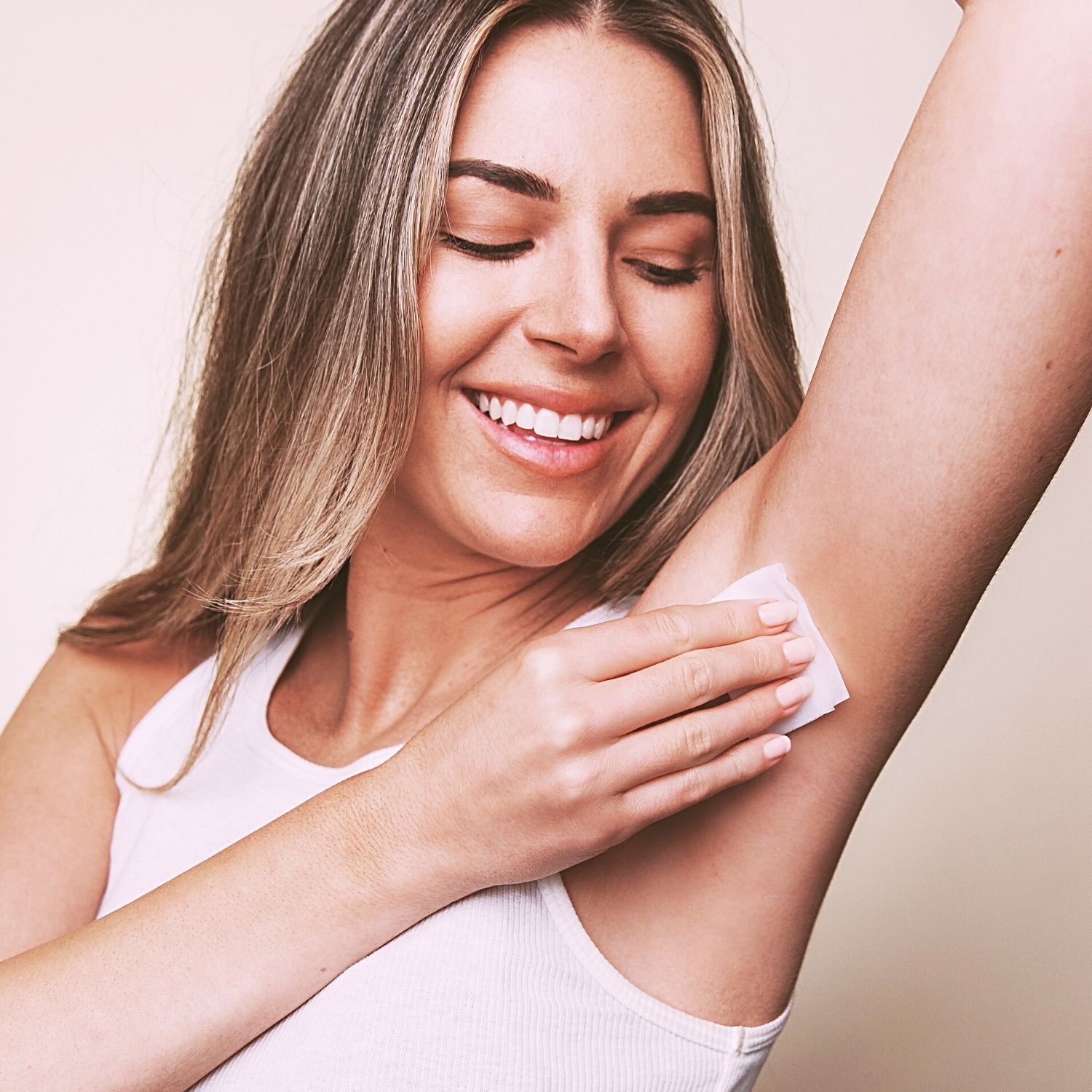
Are you using antiperspirant all wrong? You might be surprised…
Most of us wake up, take a shower, apply some antiperspirant and rush off to work or school. If you’re doing this, you’re doing it wrong.
Get the most out of your antiperspirant by following these simple steps:
a) Apply at night or before sleep:
Your antiperspirant needs time and a dry skin surface to effectively block the sweat glands. Bedtime provides just that. Figuring out how to stop sweating so much might involve changing your routines.
When you sleep, your body is less active, your body temperature reduces, and you’ll likely sweat less. These less active hours with lower sweat levels provide the perfect environment for antiperspirant to work its magic. Make sure you have a cool place to sleep to get the best results.
b) Make sure skin is clean and dry:
Your armpits and other body areas should be dirt and moisture free before applying antiperspirant. Even the slightest residue from deodorant could reduce the effectiveness of your antiperspirant. For best results, shower and dry off completely before using antiperspirants.
c) Remove body hair to get better skin contact:
Antiperspirant works best when it has good contact with the skin. However, hairy armpits can make this difficult. For best results, consider trimming or shaving unruly underarm hair.
Don’t apply antiperspirant immediately after shaving. Wait at least a day to avoid unwanted skin irritation.
Trimming body hair can also help with body odor – bacteria love damp, moist areas and hairy spots make great places for bacteria to thrive.
Don’t give up if antiperspirant doesn’t stop sweat on the first try:
If the sweat keeps flowing even after applying antiperspirant, don’t panic. Sometimes it can take 3 or more consecutive applications to get sweat under control.
3. Dress Smart. Sweat Less.

Heavy sweating just happens for many. As the weather changes, so does your wardrobe. You dress light during hot weather, and bundle up when it’s cold. Mastering the ins and outs of how to stop sweating during these shifts requires attention to attire.
For a lot of us, heavy sweating just happens. It doesn’t matter how hot it is, how cold it is, if you’re running a marathon or sitting on the couch – the sweat comes… and comes…
It doesn’t hurt to have a few wardrobe tricks up your sleeve to conceal and reduce sweating when it matters most.
Dress in light, breathable fabrics with ample ventilation
Wick moisture away by dressing in lighter layers with more air flow keeps the heat down and reduces sweat build up on your clothing. Knowing how to stop sweating with the right clothing can be a game changer.
Moisture-wicking fabrics can be a heavy sweaters best friend. If you’re trying to figure out how to sweat less, look for natural materials like cotton, linen, and silk. Additionally, it’s advisable to avoid dark colors and choose light ones instead, as they tend to reflect sunlight and heat, contributing to a cooler feel.
Sweat absorbing, sweat proof undershirts can also help hide embarrassing underarm sweat.
And one more thing, don’t forget to wear socks, especially when training. Ensuring your feet are properly covered with socks can contribute significantly to managing overall body temperature. Socks help regulate your body’s heat, preventing excessive sweating by keeping your feet comfortably insulated. This simple wardrobe choice can make a noticeable difference in your comfort level, especially during those moments when sweating matters most.
Avoid sweat amplifying colors when possible
If you have an important meeting or social event – ditch the light blues, grays, and bright colors. These colors are infamous for highlighting unsightly pit stains and sweat marks.
Keep these sweat-concealing colors and styles handy
Dark blues, blacks, dark colors and distracting patterns are excellent sweat-camouflage. Jackets, hoodies and sweatshirts are always useful in keeping sweat marks hidden. How to stop sweating so much isn’t just about what products you use, but also what you wear.
But seriously, “dressing strategically” just isn’t fun. Why say goodbye to tank tops, colorful tops, and dapper dress shirts when you can use a strong antiperspirant to stop armpit sweat.
4. Manage Diet to Control Sweat
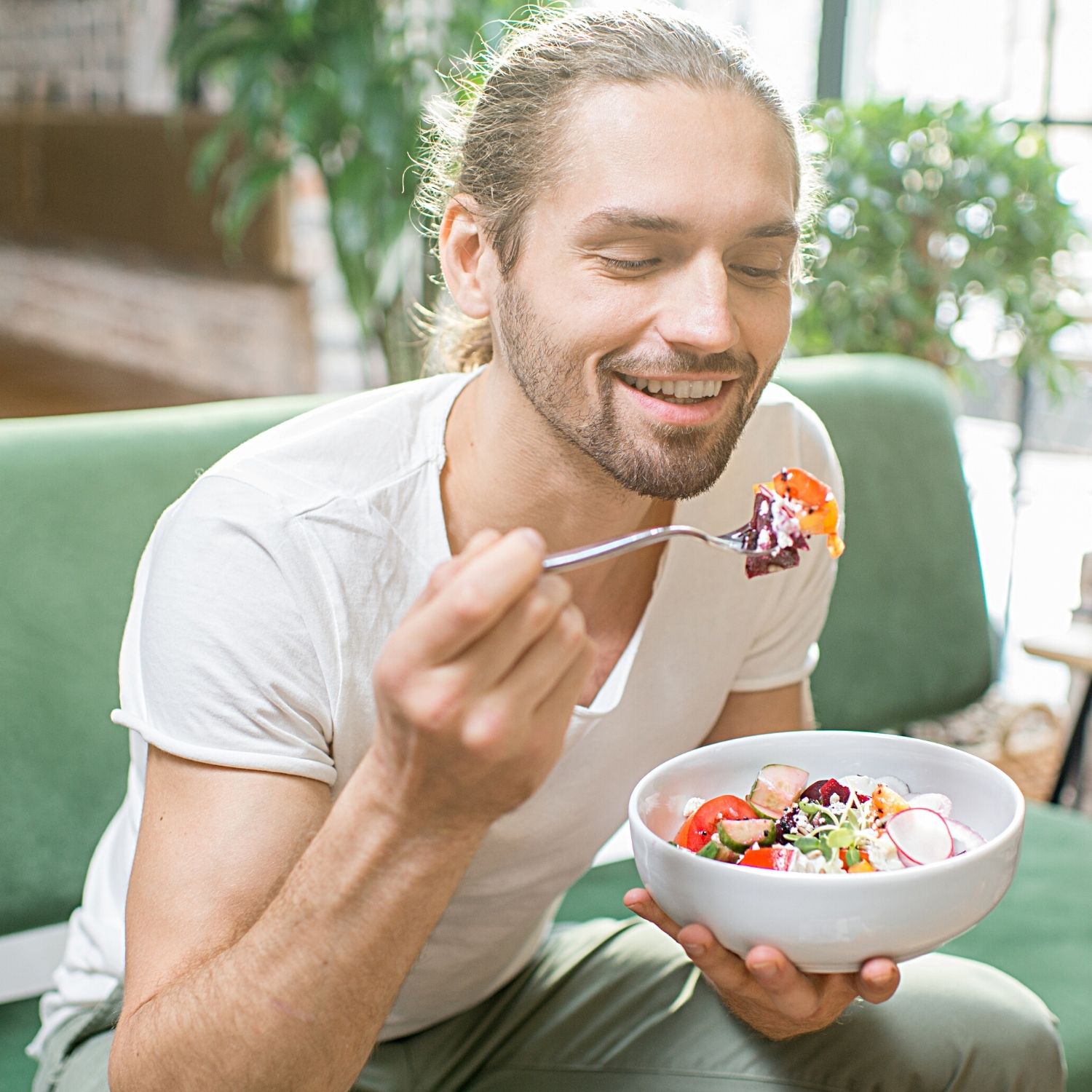
Your diet can influence your health, your physique, and your sweat levels. Eating certain foods can make you sweat more than normal. Avoiding other foods can help you sweat less.
How to stop sweating with diet tricks:
- Stay hydrated: Aside from keeping you alive, water provides other useful benefits. In this instance, it helps cool your body. Lower core temperature means your body doesn’t have to sweat as much to release extra heat. On the other hand, dehydration can lead to more sweating. Moral of the story, drink plenty of water and you’ll sweat a lot less. You may have heard the eight cups a day rule, but experts suggest nine cups for women and 13 for men.
- Avoid spicy foods: Your body reacts to spicy food the same way it would to a hot, sunny day. It makes you sweat, even if the outside temperature is cold.
- Cut down on deep fried, fatty, processed foods: Avoid fast foods, chocolate, white bread, junk food, and other carb-loaded comfort foods. Some people swear that a low carb/no carb lifestyle can be a cure for excessive sweating.
- Avoid caffeine-loaded coffee & energy drinks: Unfortunately, your morning coffee isn’t just good for extra energy – that shot of caffeine is also great for extra underarm sweat.
- Take Vitamin B: Vitamin B helps your organs and other vital systems function properly. So when you have enough vitamin B in your body, it doesn’t work as hard, which of course means you produce less sweat. Mastering how to stop sweating so much might also involve the right vitamins. Even better, adding a vitamin B tablet to your daily routine can also give you more energy throughout the day.
- Eat your fruits and veggies: Eating fruits and vegetables is a great way to reduce the amount of sweat your body generates. Fruits and veggies can help aid in the digestion process and give you essential vitamins. If your digestion is off, your body automatically produces excess sweat.
- Fruits and veggies that promote healthy digestion: Cucumbers, Celery, Watermelon, Spinach, Lettuce, Grapefruit, Bell Peppers, Olive Oil.
5. Exercise Regularly to Reduce Stress Sweat
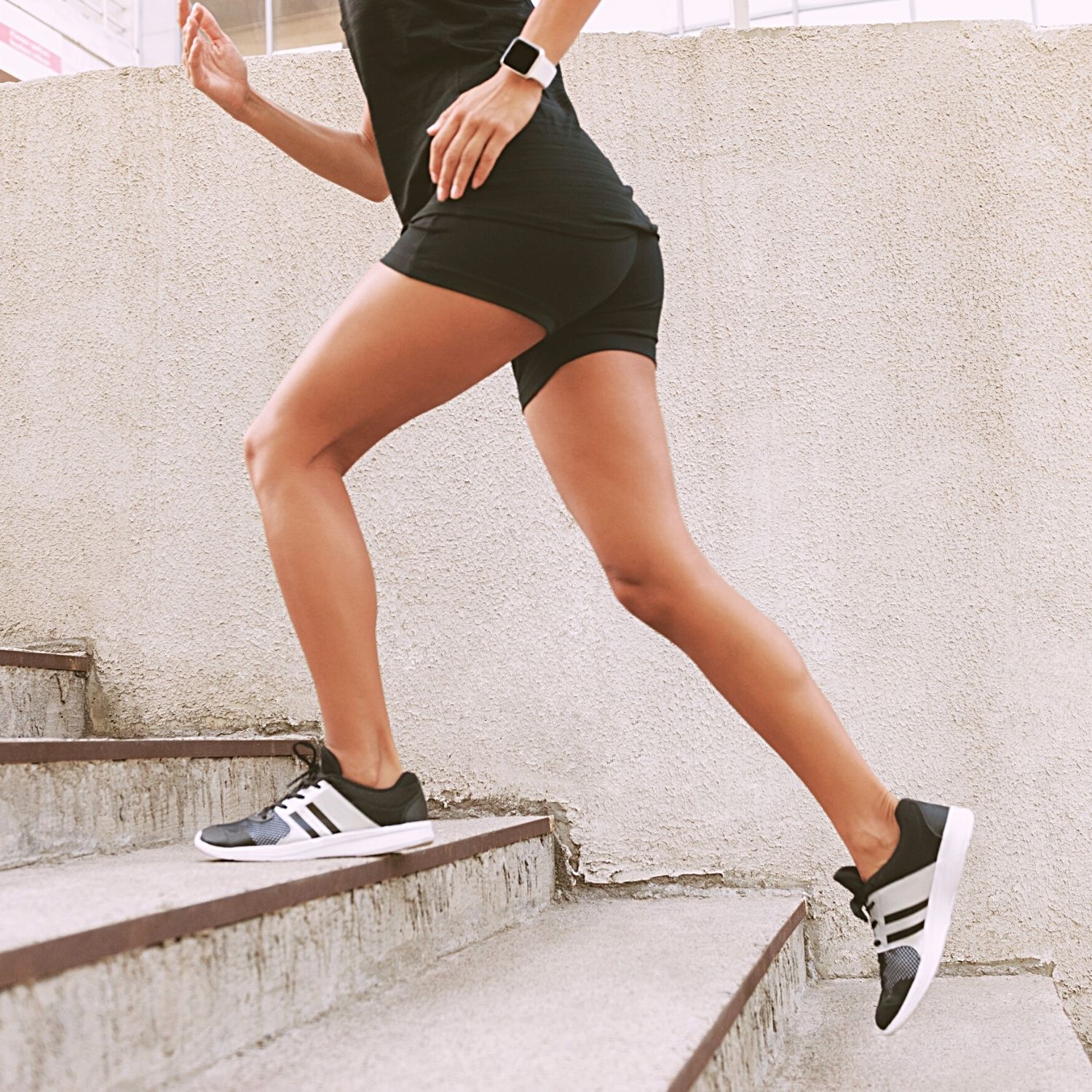
Typically, we don’t think of exercise as a way of reducing sweat. But in this case, it can do exactly that. Knowing how to stop sweating with regular physical activity is not just about fitness, but overall body wellness.
Here’s how: First, exercise can lower the stress hormone cortisol. Second, exercise can trigger the release of endorphins. Endorphins reduce your perception of pain, help you relax, and provide a feeling of satisfaction, kind of like morphine.
Lower stress hormone levels combined with the release of endorphins puts your body at ease. This can minimize the chance of a heavy sweating response to everyday stressors.
So if you’re wondering how to reduce sweat,
Less stress = less sweat.
6. Relax – Don't "Sweat" Your Sweat
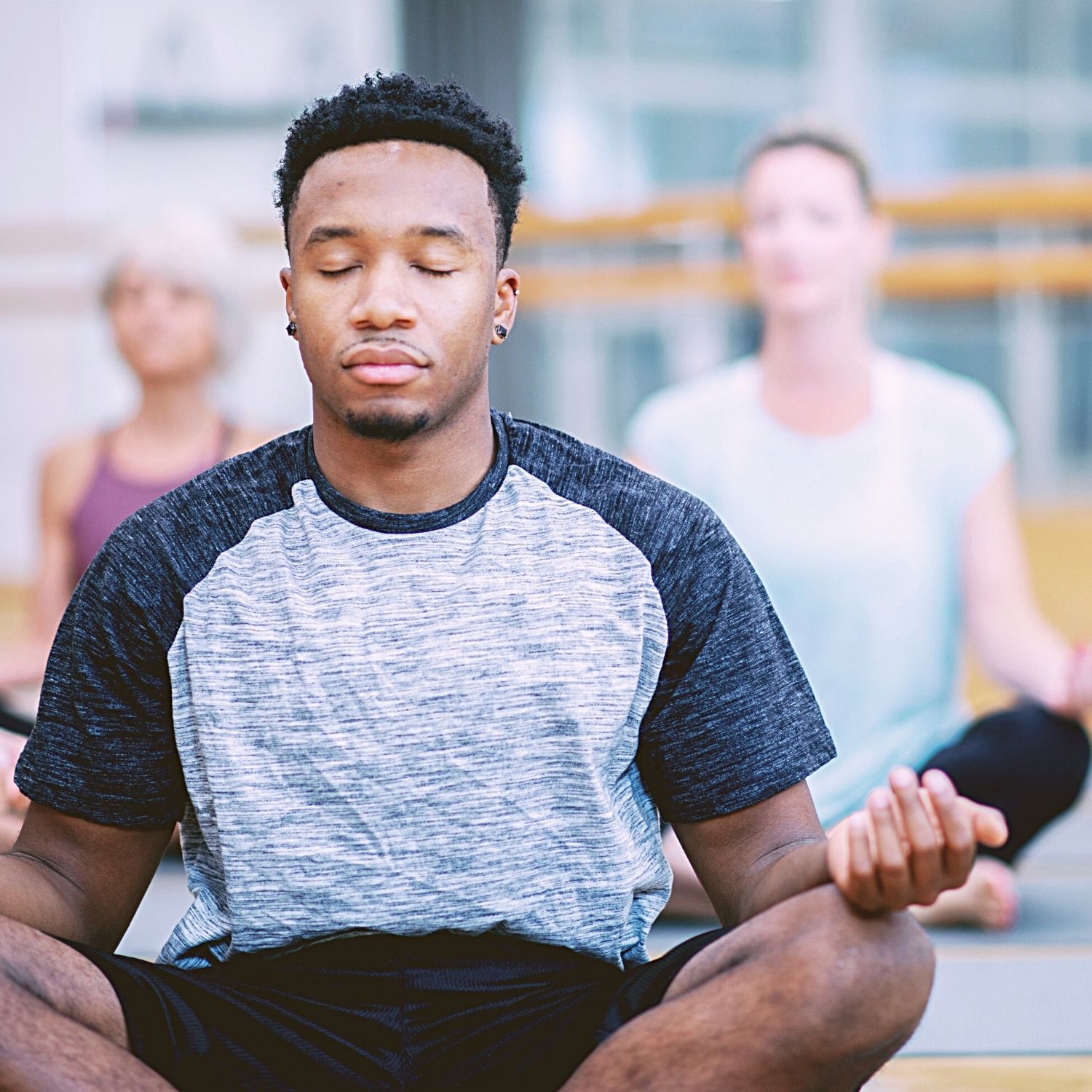
Stop me when this sounds familiar…
You start to sweat a little… then you start stressing about your sweat… your stress makes you sweat even more… your sweat makes you stress even more… and finally… an all out sweat-tsunami.
Nervous sweating happens when your body mistakenly thinks it’s in danger. Although scary, first dates and job interviews are hardly dangerous. But your body doesn’t know that when it kicks into fight-or-flight mode and cranks up your sweat glands.
Here’s the secret: you need to trick your body into thinking common stressors are no big deal (i.e. job interviews, first dates, sales calls, tests, whatever stresses you out.)
Learn what your stress / sweat triggers are and how to stop sweating so much by following these tips:
Prepare: Before you encounter a stressful situation, study your thoughts. Ask yourself, what do you really have to be nervous about? Write it down. Once you’ve established the source of your stress, it becomes easier to dispel it.
Practice the meditation techniques below to prepare your mind for potentially stressful situations.
Breath: Tell yourself to breathe. It’s not uncommon for people to unknowingly hold their breath when under stress. Taking a slow, deep breath tells your body that it’s not in any sort of danger. Inhale deeply and slowly through your nose, hold your breath for three seconds, then exhale slowly through your mouth. Repeat this 10 times.
Focus on the moment: Don’t get caught up in all the worst-case scenarios that stress puts you through. If you let yourself get carried away, you’ll end up sweating over those “what ifs” and lose focus on the moment at hand. How to stop sweating in these situations? Don’t Obsess Over the Sweat: If you start to sweat, don’t worry about it. You don’t need to add another layer of worry to the stress ball which induced the sweating in the first place. Don’t let uninvited sweat marks distract you from important things in life.
Don’t obsess over the sweat: If you start to sweat, don’t worry about it. You don’t need to add another layer of worry to the stress ball which induced the sweating in the first place. Don’t let uninvited sweat marks distract you from important things in life.
Avoid known stress / sweat triggers: While we’d encourage you to learn how to defuse stressful situations, another option is to avoid them altogether. If you work in a stressful environment, associate with stressful people or eat foods that lead to anxiety and stress, stop. A lot of times, once the sweat trigger is removed, most people notice a dramatic reduction in excess sweat almost immediately.
7. Home Remedies to Stop Sweating
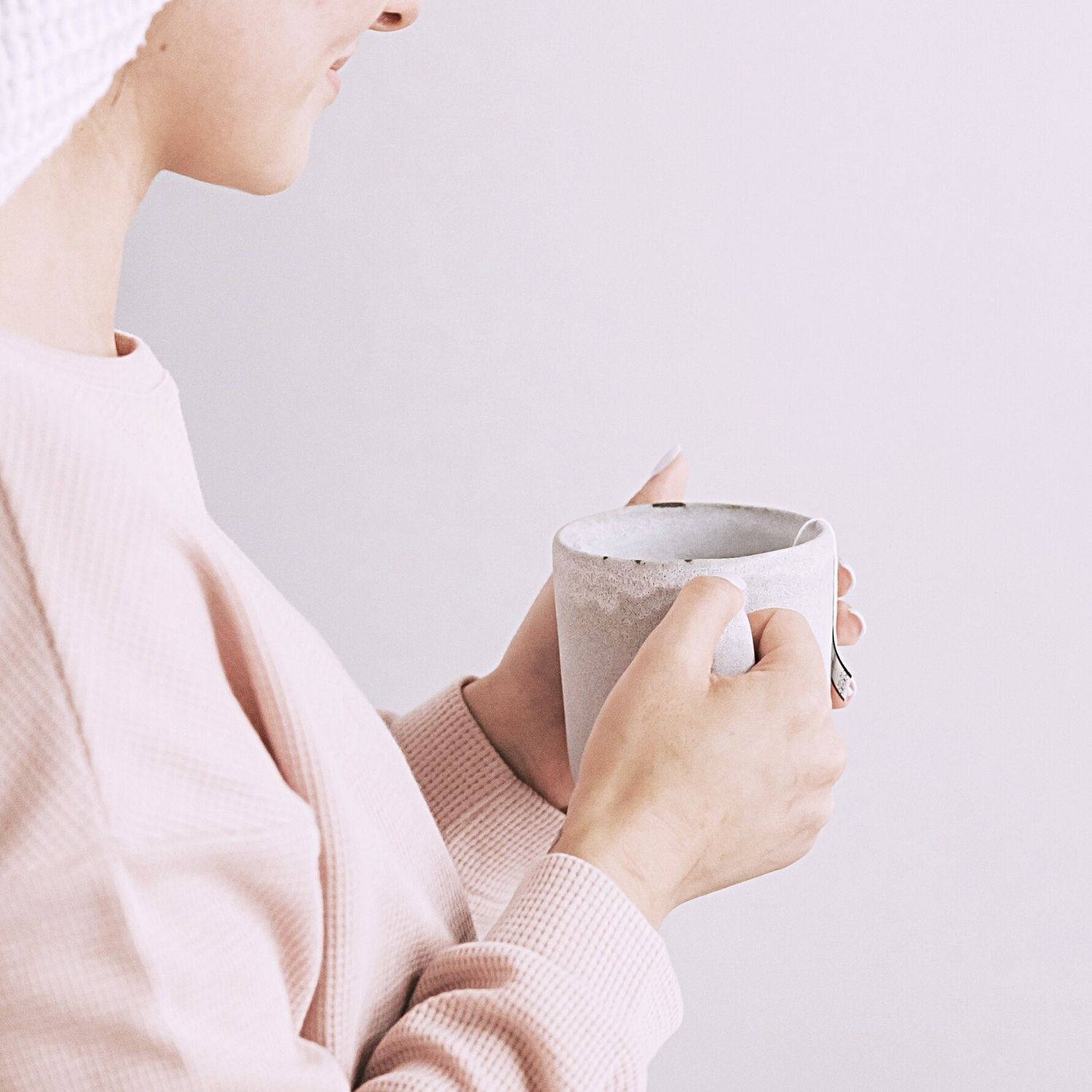
If you want to learn how to stop sweating naturally, follow tips 3, 4, 5 and 6 above. Then, try some of the natural sweating treatments below. Like most home remedies, this sweat remedy list won’t always cure your perspiration problems. If stopping sweat naturally is a priority to you, it’s a good place to start.
Apple cider vinegar
Apple Cider Vinegar is a natural astringent. When applied topically, it tightens skin pores and helps control sweat production. It can also help rid your body of odor-causing bacteria by balancing pH levels of the body. In a way, it’s a natural antiperspirant and deodorizer.
- Soak a cotton ball in apple cider vinegar until it’s fully saturated.
- Apply apple cider vinegar to your problem areas at night just before you go to bed.
- In the morning, wash vinegar off of your skin before you start getting ready for the day.
How can ACV help you to stop sweating so much? Some claim that drinking apple cider vinegar daily can help dry out your skin and reduce sweating. Mix 2 tablespoons of ACV with honey and enjoy. (Be warned, this stuff does not taste like apple cider 🙂)
Sage tea sweating remedies
Sage is one of the better herbal remedies for excessive sweating. It contains a natural astringent called tannic acid. Tannic acid has the ability to constrict and shrink your skin and pores. This shrinking helps reduce sweat just like an antiperspirant. Sage also helps kill odor-causing bacteria found in the armpits and feet.
For underarm sweating…
- Add two sage tea bags to two cups of boiling water.
- Let steep and cool to room temperature.
- Dab generously on underarms with a clean towel.
- Repeat two or more times daily for best results.
For sweaty hands and feet…
- Add four to five sage tea bags to a quart of boiling water.
- Let the tea steep until it’s cool enough to touch.
- Once cooled, soak your hands/feet in the sage solution for 30 minutes.
- Repeat his process daily (multiple times daily for best results).
Feeling brave? Drink a cup of sage tea before bedtime. Some experts claim that drinking sage tea daily can help control sweating.
Black tea sweat remedy
Black tea makes a great natural antiperspirant due to its high levels of tannic acid. Its astringent properties tighten the skin and constrict the pores to reduce sweat. How to stop sweating so much with black tea:
For underarm sweating…
- Add two tea bags of black tea to three to four cups of boiling water.
- Steep for 10-15 minutes and let cool.
- Dab thoroughly on underarms.
For hand and foot sweating…
- Add two bags of black tea to four cups of boiling water.
- Allow to steep in a large basin or bowl for 10 minutes.
- When water is cool enough to touch, soak your palms or feet for 20 minutes.
Repetition is key. The effectiveness of this natural sweating treatment can increase as you repeat the process daily.
Chamomile tea for heavy sweating
Chamomile is one of the best herbs for eliminating stress and promoting relaxation. Both things that contribute to sweating too much. Chamomile can also aid in digestion and get rid of body odor.
How to stop sweating and reduce stress with chamomile… Drink two to three cups of chamomile tea each day to stay calm and fresh smelling. Remember, less stress and anxiety can lead to less sweat.
You might also place a few drops of chamomile oil into your bath water for a nice chamomile soak.
Wheatgrass sweat remedy
Wheatgrass can influence common sweat triggers including: pH levels, metabolism, digestive system, toxin levels, and chronic illness. These are all contributors to sweat production. Adding wheatgrass to your daily regime can help keep these sweat triggers in the “off” position.
Drink wheatgrass juice daily to get maximum benefit (available in powder form also).
Witch hazel
Witch hazel is also one of nature’s natural astringents (ability to shrink skin and constrict pores). Some of the most effective antiperspirants contain witch hazel. It can be particularly helpful in preventing face sweating.
For sweaty face, armpits and feet…
- Soak a cotton pad in a witch hazel solution and apply to affected areas.
- You can leave the witch hazel on or wash it off after 30 minutes.
- Repeat this process daily for maximum effectiveness.
Potatoes for sweating
Some home remedy experts claim that potatoes can absorb excess sweat on the body. This one does seem a bit “out there” but many consider it an effective natural antiperspirant.
- Take a small piece of potato, rub it on your sweat-prone areas.
- Let the potato residue dry completely on skin before getting dressed.
- Experts also suggest wearing light, loose-fitting clothing.
Baking soda for odor and sweat
Baking soda actually does more for odor than sweat reduction. However, it does have sweat-absorbing properties that can keep you less sweaty for short periods. Because baking soda is so efficient at odor elimination it’s more of an odor blocker than a sweat blocker.
Many natural deodorants will use some form of baking soda for odor fighting. It has the ability to lower pH levels in your body and absorb foul odors caused by bacteria.
For sweaty underarms…
- Mix equal parts baking soda and cornstarch. Additionally, you can add lavender essential oil for its skin-soothing properties and sweet fragrance.
- Apply the mixture with a damp cloth to clean underarms.
- After 20-30 minutes, rinse with water.
Can baby powder stop sweat?
Contrary to some advice, baby powders and body powders don’t actually stop sweat. However, they can absorb sweat and reduce some of the stickiness caused by sweat. Body powder can be helpful for sweaty feet and sweat prone private areas. For a cleaner application experience you can even use a body powder lotion that goes on like a lotion, but dries like a powder.
Can alcohol make you sweat less?
Alcohol doesn’t stop sweating completely. It works the same way vinegar does. It dries out your skin and helps close the pores which can prevent sweating. You can use rubbing alcohol topically. Just apply it the same way you would the apple cider vinegar.
Alcohol wipes for sweaty hands
Alcohol wipes can be a quick, though temporary, fix for sweaty hands. Rub your palms with alcohol wipes before important meetings or social encounters. This will dry out your hands and help you avoid sweaty handshakes.
8. Medications to Prevent Excess Sweating
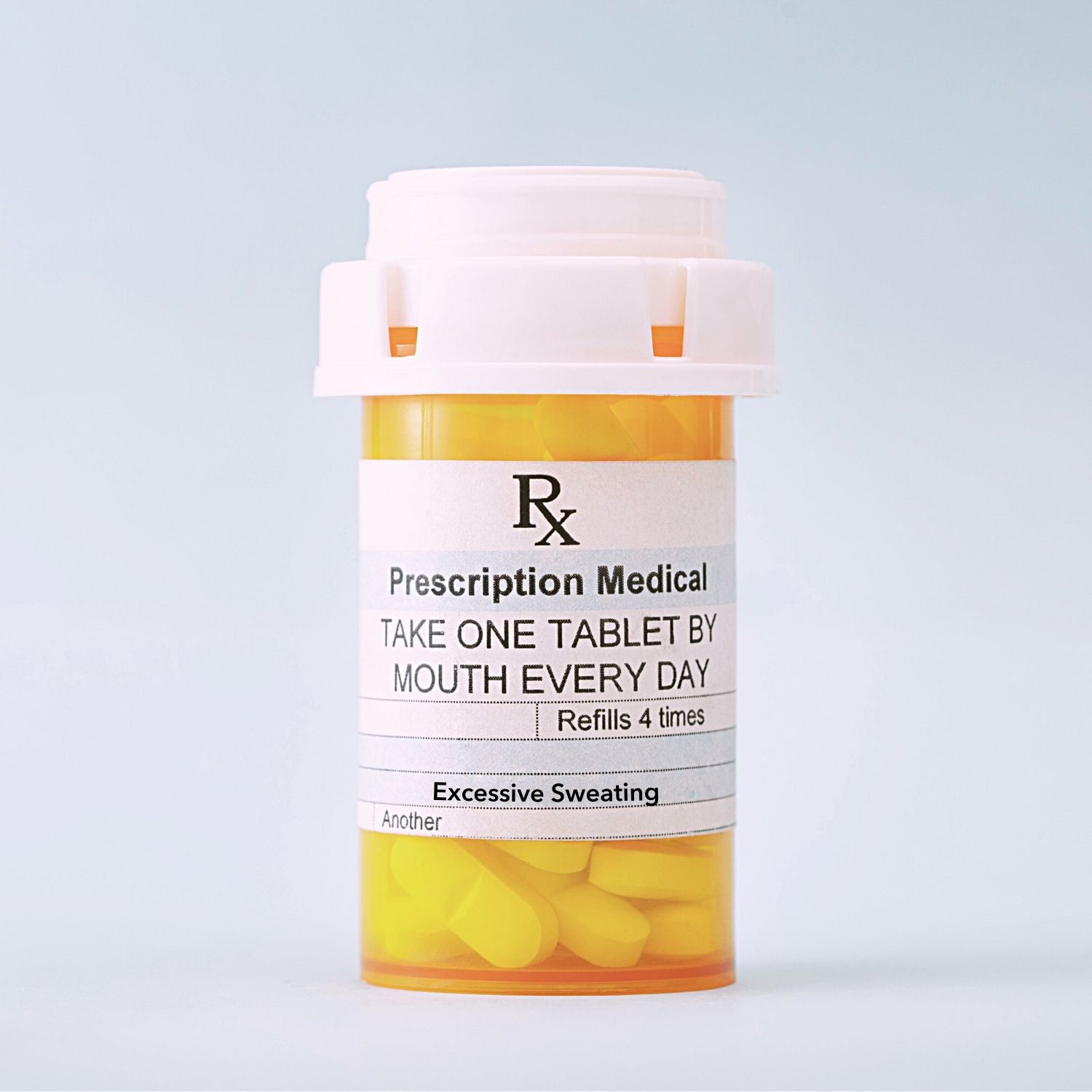
How to stop sweating if traditional antiperspirants and sweating home remedies aren’t helping you sweat less? You might need to look at more advanced treatments for excessive sweat and hyperhidrosis.
What medications can stop sweat?
If an individual encounters a sudden onset of profuse sweating, it is advisable to seek medical attention promptly especially since secondary hyperhidrosis is often linked to an underlying medical condition or medication side effects Various medications can be effective in managing this condition.
But using medication to stop sweating shouldn’t be your first option. You should talk to your doctor and undergo a physical exam to determine if you need it and which type of prescription medicine is right for you. Sweating medications are available in topical, prescription creams, and oral forms.
Prescription anticholinergics
If you’re still wondering how to stop sweating so much when all other options are exhausted, there are other treatments a doctor may prescribe such as anticholinergic medication. These medications work by blocking the signals in your brain that tell your body to produce sweat. It sounds a little scary, but it can be a very effective sweating treatment.
However, they may not be suitable for everyone due to potential side effects, including blurred vision, heart palpitations, dry eyes, dry mouth, and difficulty urinating.
Common prescription medications for sweating:
- Glycopyrrolate
- Propantheline
- Benztropine
- Oxybutynin
Topical prescription-strength treatments
When it comes to how to stop sweating with medicine, a downside to some hyperhidrosis and sweating medications is that they stop sweating everywhere. Sometimes, you just need to treat underarm sweat.
New hyperhidrosis treatments have been developed in the last few years including a popular prescription option called Qbrexza. This sweat blocking wipe can be applied to the underarms to stop armpit sweat. The benefit of Qbrexza is that it will only treat the area where it’s applied. As with any prescription there are higher costs, both financial and health related. No prescription comes without it’s side effects.
Prescription antiperspirants are also available. These prescription-only antiperspirants use higher levels of aluminum chloride (sometimes 20% or more) to control excessive sweat. While effective, they can also cause burning, itching and severe skin irritation. Try a clinical strength antiperspirant before choosing a prescription antiperspirant option.
9. Hyperhidrosis Surgery and Other Advanced Treatments
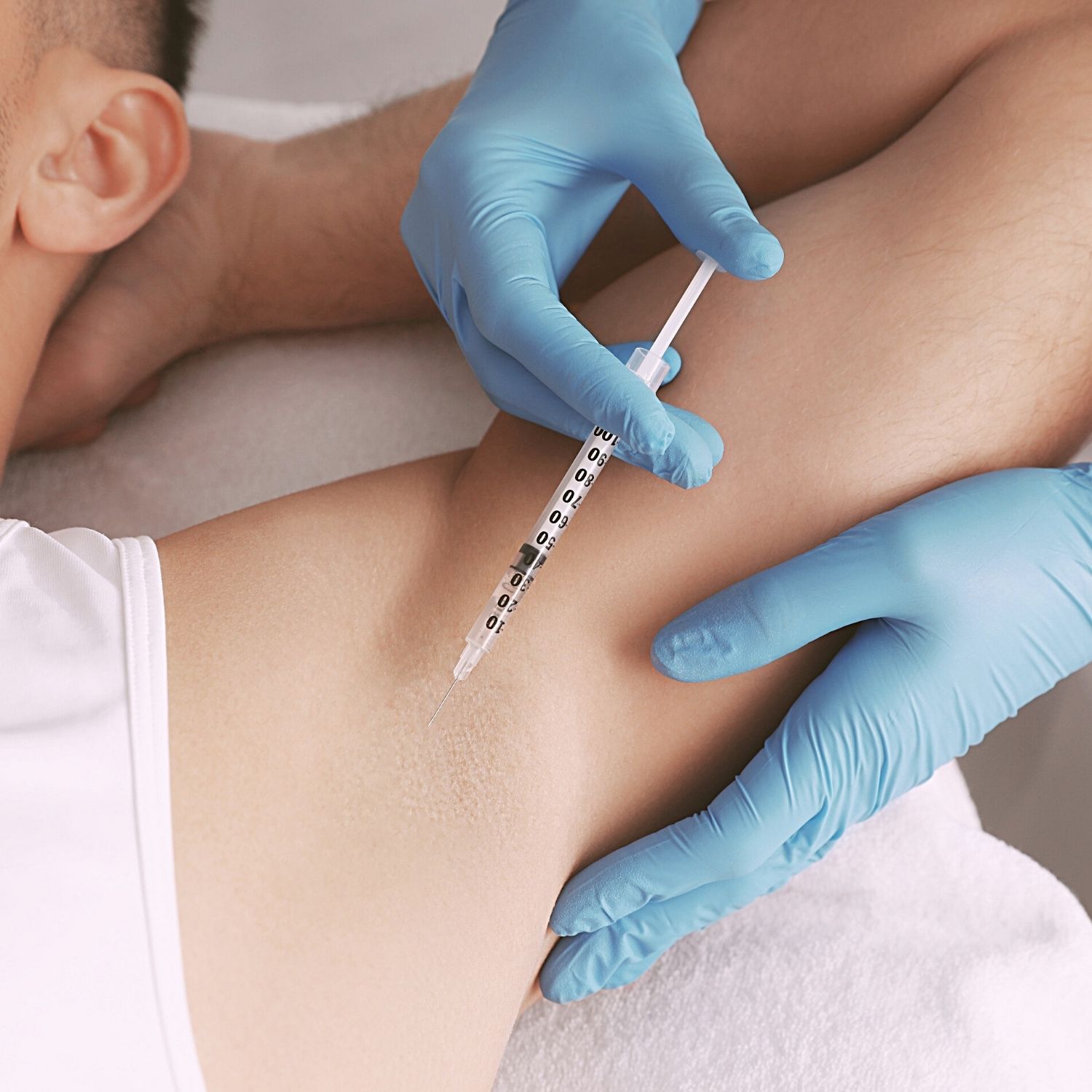
Botox® to stop sweating
If a clinical strength antiperspirant isn’t working for you, Botox® may be a viable treatment to stop stubborn sweat. OnabotulinumtoxinA Injections (Botox®) work by blocking a specific neurotransmitter in your body that stimulates your sweat glands. It essentially blocks the chemicals responsible for turning your sweat glands “on”.
Botulinum toxin injections involve the insertion of small needles into sweat prone areas of your body (armpits, hands, feet, head and face). If needles make you squeamish, you may want to look elsewhere for your sweating cure.
Botox injections are not a permanent fix, but it can be effective. In fact, a few injections into the armpits can prevent excessive sweating for up to 6 months. Because of this, many brides choose this option to avoid getting sweat stains on their wedding dress. Sometimes teenagers heading to prom might also get this treatment, with their parents’ approval and credit cards, of course.
How to stop sweating with miraDry
miraDry is a non-invasive process where your sweat glands are “zapped” with electromagnetic energy. No sweat glands mean no sweat. Since your sweat glands don’t grow back, the results are long lasting, if not permanent. miraDry treatment costs are around $3000 and those who have undergone the procedure describe it as painful.
Studies reveal an 83 percent reduction in excessive armpit sweating. So if you can fork up the cash and don’t mind parting with your sweat glands for eternity, it might be a good idea.
How to stop sweating with Iontophoresis “injection without a needle”
Iontophoresis is a procedure used to treat hyperhidrosis on the hands and feet. It’s an advanced treatment for people who suffer from hyperhidrosis or people who have failed to achieve results with clinical strength antiperspirants.
How does Iontophoresis work? It’s like an electrical injection. Patients place their hands or feet in water medicated with an anticholinergic (hyperhidrosis medication). Then the Iontophoresis device delivers the medication via electrical currents through the skin. Iontophoresis has been effective in treating sweaty feet, sweaty hands and facial hyperhidrosis.
How to stop sweating with Endoscopic Thoracic Sympathectomy (most invasive)
This procedure is considered very effective but is typically employed as a last resort for individuals who have exhausted every other treatment option. Endoscopic Thoracic Sympathectomy (ETS) involves destroying nerve endings associated with overactive sweat glands and is recognized as one of the most dangerous treatments for excessive sweating.
It’s crucial to note that ETS is irreversible and may leave scars. One common side effect experienced by almost everyone undergoing ETS is compensatory sweating. This phenomenon occurs when the body ceases sweating in the treated area but compensates by increasing sweat production in another region, such as the face or chest.
It’s essential to thoroughly weigh the risks and benefits of such an invasive procedure and consult with healthcare professionals before considering Endoscopic Thoracic Sympathectomy as a potential solution for managing excessive sweating.
How to stop sweating with curettage for underarm (axillary) hyperhidrosis
This treatment involves scraping and vacuuming out the sweat glands in the armpit area. Ouch.
How To Sweat Less During Social Interactions
When you find yourself out and start sweating, there are several immediate actions you can take to mitigate the discomfort and regain control. Firstly, a practical tip for those wondering how to stop sweating during social interactions, is to carry a small, portable fan or using tissues to gently blot excess moisture from the skin. Taking short breaks in shaded or cool areas can also help regulate body temperature and reduce perspiration.
Additionally, consider incorporating discreet accessories into your wardrobe, such as absorbent underarm pads or moisture-wicking clothing, to minimize the visible effects of sweating. Carrying a travel-sized antiperspirant can be invaluable for on-the-go applications, providing a quick solution to sweat less during social outings.
Moreover, anyone interested in learning how to stop sweating so much should know that practicing mindfulness techniques, like focused breathing or visualization, can help manage stress-induced sweating. In situations where social anxiety triggers perspiration, finding a moment for a brief meditation or focusing on positive thoughts can contribute to reducing sweating.
Learning how to stop sweating might take you some time. It isn’t always easy to determine what type of products will work best to stop sweat for you. But there are plenty of options available. And once you find a solution that works, you can worry less about things like clammy hands, facial sweat or sweat-drenched shirts. You can hold your head high and walk into that first date or job interview with confidence.
You might also like...
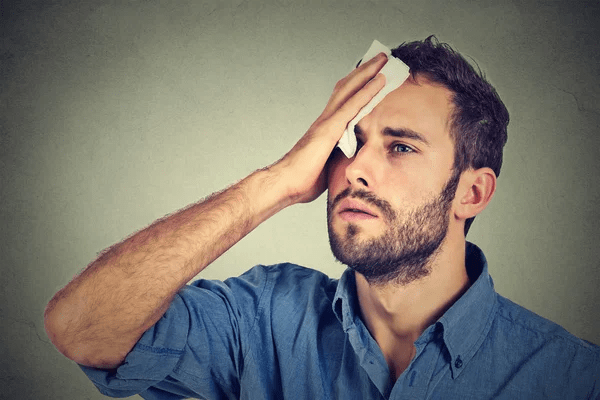
Why Does My Face Sweat So Much?: Tips And Treatments For Face Sweating
Table of Contents Do you ever feel like you’re the sweatiest person in the room? Is face sweating getting in
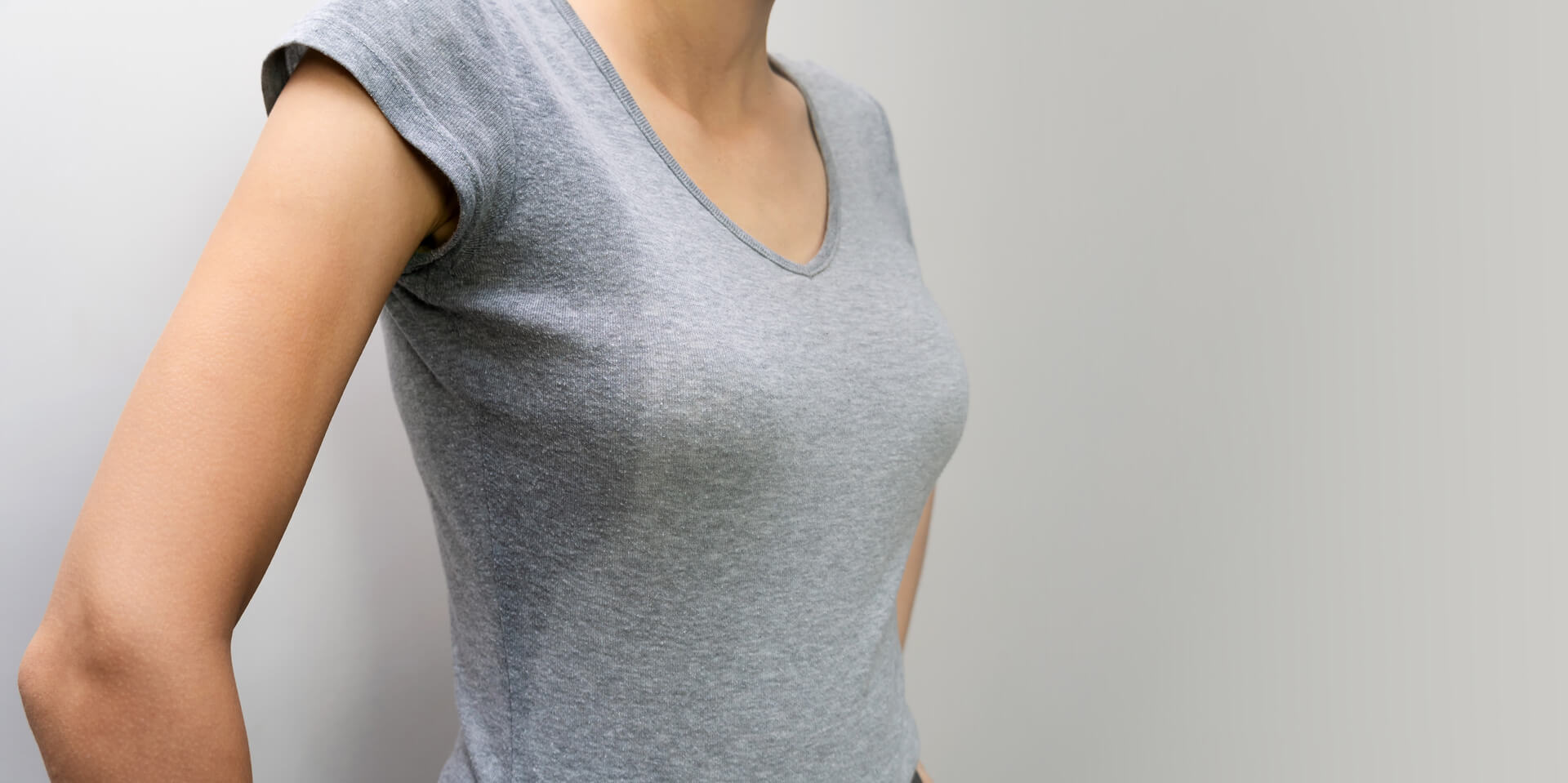
How to Stop Sweating Naturally – Huge List Tips & Home Remedies
Table of Contents For most people, sweating is a totally natural bodily function. For others, it’s a nonstop nightmare. Excessive

Top 10 Best Deodorants For Sweaty Armpits
Do you struggle with sweaty armpits? Has your deodorant let you down when it comes to stopping sweat and providing




